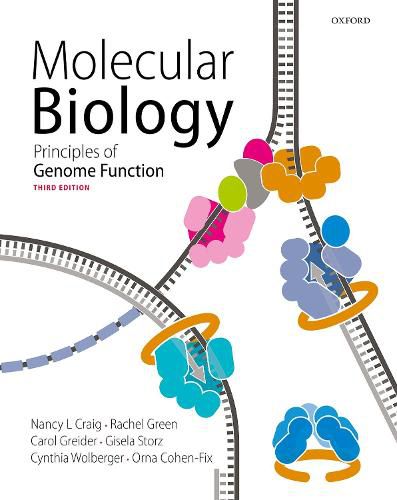Readings Newsletter
Become a Readings Member to make your shopping experience even easier.
Sign in or sign up for free!
You’re not far away from qualifying for FREE standard shipping within Australia
You’ve qualified for FREE standard shipping within Australia
The cart is loading…






Molecular Biology: Principles of Genome Function offers a fresh, distinctive approach to the teaching of molecular biology. It is an approach that reflects the challenge of teaching a subject that is in many ways unrecognizable from the molecular biology of the 20th century - a discipline in which our understanding has advanced immeasurably, but about which many questions remain to be answered.KEY FEATURESA focus on the underlying principles equips students with a robust conceptual framework on which to add further detail from the vast amount of scientific information available to us todayAn emphasis on commonalities reflects the conserved molecular processes and components that we now know to exist between bacteria, archaea and eukaryotesExperimental Approach panels demonstrate the central importance of experimental evidence to furthering our understanding of molecular biology by describing research that has been particularly valuable in elucidating different aspects of the subjectOnline resources, for both instructors and students alike, enhance the educational value of the textNEW TO THIS EDITIONNew content on epigenetics, targeted genome editing and pre-mRNA splicingCutting-edge scientific breakthroughs in CRISPR technology, including a description of newly defined steps in the molecular mechanisms underlying CRISPR-mediated adaptation in bacterial adaptive immunity; and a description of a recently discovered transposable element family whose integration mechanism is closely related to and involves molecular relatives of the CRISPR-Cas bacterial adaptive immunity systemEnhanced coverage of DNA replication and regulatory RNAsSeven new Experimental Approach panelsThis title is available as an eBook. Please contact your Learning Resource Consultant for more information.
$9.00 standard shipping within Australia
FREE standard shipping within Australia for orders over $100.00
Express & International shipping calculated at checkout
Molecular Biology: Principles of Genome Function offers a fresh, distinctive approach to the teaching of molecular biology. It is an approach that reflects the challenge of teaching a subject that is in many ways unrecognizable from the molecular biology of the 20th century - a discipline in which our understanding has advanced immeasurably, but about which many questions remain to be answered.KEY FEATURESA focus on the underlying principles equips students with a robust conceptual framework on which to add further detail from the vast amount of scientific information available to us todayAn emphasis on commonalities reflects the conserved molecular processes and components that we now know to exist between bacteria, archaea and eukaryotesExperimental Approach panels demonstrate the central importance of experimental evidence to furthering our understanding of molecular biology by describing research that has been particularly valuable in elucidating different aspects of the subjectOnline resources, for both instructors and students alike, enhance the educational value of the textNEW TO THIS EDITIONNew content on epigenetics, targeted genome editing and pre-mRNA splicingCutting-edge scientific breakthroughs in CRISPR technology, including a description of newly defined steps in the molecular mechanisms underlying CRISPR-mediated adaptation in bacterial adaptive immunity; and a description of a recently discovered transposable element family whose integration mechanism is closely related to and involves molecular relatives of the CRISPR-Cas bacterial adaptive immunity systemEnhanced coverage of DNA replication and regulatory RNAsSeven new Experimental Approach panelsThis title is available as an eBook. Please contact your Learning Resource Consultant for more information.